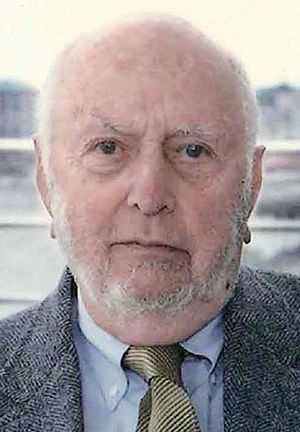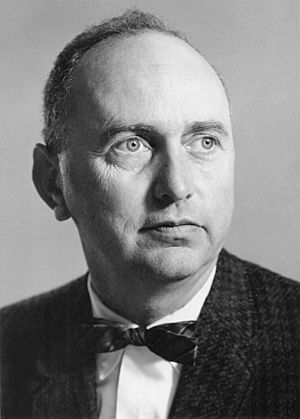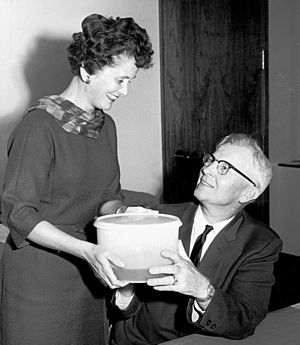Douglass North facts for kids
Quick facts for kids
Douglass North
|
|
|---|---|

Douglass North in 1997
|
|
| Born | November 5, 1920 Cambridge, Massachusetts, U.S.
|
| Died | November 23, 2015 (aged 95) Benzonia, Michigan, U.S.
|
| Institution | University of Washington Rice University Cambridge University Washington University in St. Louis Stanford University Hoover Institution US Merchant Marine Academy |
| Field | Economic history |
| School or tradition |
New institutional economics |
| Alma mater | University of California, Berkeley |
| Influences | Melvin M. Knight |
| Awards | Nobel Memorial Prize in Economic Sciences (1993) |
| Information at IDEAS / RePEc | |
Douglass Cecil North (November 5, 1920 – November 23, 2015) was an American economist known for his work in economic history. He was the co-recipient (with Robert William Fogel) of the 1993 Nobel Memorial Prize in Economic Sciences. In the words of the Nobel Committee, North and Fogel "renewed research in economic history by applying economic theory and quantitative methods in order to explain economic and institutional change."
Biography
Douglass North was born in Cambridge, Massachusetts, on November 5, 1920. He moved several times as a child due to his father's work at MetLife. The family lived in Ottawa, Lausanne, New York City, and Wallingford, Connecticut.
North was educated at Ashbury College in Ottawa, Ontario and the Choate School in Wallingford, Connecticut. He was accepted at Harvard at the same time that his father became the head of MetLife on the west coast, so North opted to go to University of California, Berkeley. During his time at Berkeley, North was a member of the Chi Phi Fraternity. In 1942, he graduated with a B.A. degree in General Curriculum-Humanities. Although his grades amounted to slightly better than a "C" average, he managed to complete a triple major in political science, philosophy and economics. That same year, he entered the US Merchant Marine Academy, graduated a year later and went to sea for three years as a deck officer.
A conscientious objector in World War II, North became a navigator in the Merchant Marine, traveling between San Francisco and Australia. During that time, he read economics and picked up his hobby of photography. He taught navigation at the Maritime Service Officers' School in Alameda during the last year of the war, and struggled with the decision of whether to become a photographer or an economist.
North returned to UC Berkeley where he obtained a Ph.D. degree in economics in 1952. He subsequently began to work as an assistant professor at the University of Washington.
North died on November 23, 2015, at his summer home in Benzonia, Michigan from esophageal cancer at the age of 95.
Academic career
From 1951 to 1956, North was an assistant professor of economics at the University of Washington, then from 1956 to 1960, an associate professor. In 1960 North became co-editor of the Journal of Economic History, popularizing Cliometrics (New Economic History), and from 1960 to 1983 he was professor of economics at the University of Washington where he also served as the chair of the economics department from 1967 to 1979. In 1979 he served as the Peterkin Professor of Political Economy at Rice University, and in 1981–82 as the Pitt Professor of American History and Institutions at Cambridge University, before joining the faculty of Washington University in St. Louis in 1983 as the Henry R. Luce Professor of Law and Liberty in the Department of Economics (where he also served as director of the center for Political Economy from 1984 to 1990). He was the Bartlett Burnap Senior Fellow at the Hoover Institution at Stanford University.
In 1991, he became the first economic historian to win the John R. Commons Award, which was established by the International Honors Society for Economics in 1965.
A collection of North's papers is housed at the Rubenstein Library at Duke University.
Research agenda
Along with Ronald Coase and Oliver Williamson, he helped found the International Society for the New Institutional Economics (ISNIE) which held its first meeting in St. Louis in 1997. His research included property rights, transaction costs, the institutional basis of markets, and economic organization in history as well as economic development in developing countries.
North served as an expert for the Copenhagen Consensus and as an advisor to governments around the world. He was engaged in research (with John J. Wallis of the University of Maryland and Barry Weingast of Stanford University) on how countries emerge from what they call "the natural state" and into long-run economic growth. He was a trustee of the Economists for Peace and Security and a special adviser to the non-profit organization Vipani.
Personal life
North was married twice. His first marriage, to Lois Heister in 1944, resulted in three sons: Douglass Jr., Christopher and Malcolm. During the marriage, Heister became a notable activist and politician. The marriage ended in divorce. North remarried in 1972, to Elisabeth Case.
Legacy
As a Nobel prize winner, North's reputation extended both from his own university environment to the international influences made by his research and writing. North's research in New Economic History has included such notable economists and historians as Jonathan Hughes, Richard Sutch, Lloyd Mercer, Jim Sheperd, Donald Gordon, Gary Walton, Lance E. Davis, Robert Huttenback, Roger Ransom, Gaston Rimlinger, Terry L. Anderson, P.J. Hill, Philip Coelho, and David Knowles as recorded in the 60th Anniversary dedication volume in memory of North.
See also
 In Spanish: Douglass North para niños
In Spanish: Douglass North para niños



